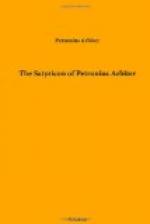If, as I may suppose, you have planned to translate some at least of the Greek and Latin classics, you can choose no more handy model than Mr. Burnaby. He is later, it is true, than the richest and best examples, but so much the nearer to you in speech. He is not always scholarly—you can safely leave scholarship to others—but he uses an excellent colloquial English with a common sense in interpretation which carries him over the many gaps in the story without any palpable difference in texture. How fragmentary the latter part of the Satyricon is you will see if you turn to the edition published last year in the Loeb Classical Library. The reading of fragments has a fascination for the curious mind: you also, I think, must have devoured those casual sheets of forgotten masterpieces in which book-sellers envelop their parcels, and have dignified the whole with an importance which it can never when in circulation have enjoyed. Balzac, you remember, plays on this weakness, which he must have shared, in La Muse du Departement, where the great Lousteau exasperates a provincial audience, assembled to hear him talk, by reading to them the inconsequent pages of Olympia, ou les Vengeances romaines; it is rich comedy, but the fragment carries us away, and at the beginning of page 209: “robe frola dans le silence. Tout a coup le cardinal Borborigano parut aux yeux de la duchesse--------” we exclaim, don’t we, with Bianchon: “Le cardinal Borborigano! Par les clefs du pape, si vous ne m’accordez pas qu’il se trouve une magnifique creation seulement dans le nom, si vous ne voyez pas a ces mots: robe frola dans le silence! toute la poesie du role de Schedomi invente par madame Radcliffe dans le Confessional des Penitents noirs, vous etes indigne de lire des romans . . .” And these are fragments that have been deliberately chosen for preservation.
Since it is still safe to assume things, I will go on to suggest to you that the Satyricon was planned, on the Homeric model, in twenty-four books, and will leave you to—in the striking words used recently by The Times of the Japanese earthquake—“grope for analogies” between the text which follows and the fifteenth and sixteenth books of the Odyssey, which you have, doubtless,




